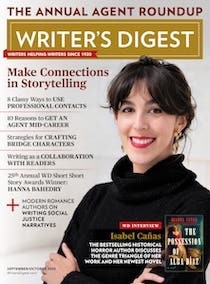You may do some of your best writing wearing a sweat suit or pajamas. Perhaps you're partial to Hawaiian prints and bangle earrings. When you attend a writing conference, however, and could be meeting editors or agents in person, it's time to project success.
That's not to say you must be good looking to get published, but you do have to appear professional.
Think about the importance of a first impression. Readers often select books based on the cover, which is why the cover art is crucial. When a writer introduces himself to agents and editors at a conference, what they see is what they get.
"Two things go into presenting a positive image: physical appearance and attitude," says Jeanne S. Archer (www.lifejourneys.com), author and motivational speaker. "It amazes me how some people confuse `casual' with `slovenly.'
Be current
For some reason, we cling to styles popular when we were last in a school environment. Rid your closets of the '60s hippie look, the '70s pointy lapels, the '80s linebacker shoulders and the '90s grunge. Writers don't have to keep up with fashion trends, but should steer clear of stuck-in-another-decade traps.
"Your appearance reflects how confident you are and can give you an air of credibility," says Marita Littauer, author and president of CLASServices (www.classervices.com), which provides resources, training and promotion for speakers and authors. "Someone whose clothing is out-of-date, worn, dirty or poorly coordinated implies that their message may be the same: out-of-date and invalid."
When approaching an agent or editor who hasn't yet read your work, use the senses to create a favorable impression. This goes beyond your look: Don't wear cologne that overpowers. Speak up, but don't yell. Use a firm handshake, but remember this isn't a strength contest.
Indicate your writing style in your business card choice. Littauer suggests your business card include your photo. "It helps to put a name with a face," she says.
Watch your tone
Trying to sell a book proposal at a conference means you have to first get the agent's or editor's attention. This is when professionalism shouldn't just show; it must shout. "Communicate that you're professional, confident and articulate with your attitude. Even if you don't feel that way at the moment, act as if you are," Archer says.
Being a professional means knowing when to speak and when to listen. "No matter how pretty you are or how well dressed, if you're always talking about yourself, sooner or later, you'll step on your tongue and people will see that you're an amateur," says S. Joan Popek (www.sjoanpopek.com), an author and former magazine editor
"No one really gives a rat's behind about you personally. What they do care about is how you tell a story. Presentation is key. Present yourself as a professional writer who knows her stuff," Popek says.
Don't be one of those writers who seems almost embarrassed at their own book signings. "Bookstore owners want a dynamic author who will smile at passing customers, make eye contact and draw them toward the book display," says author Lila Guzman (www.talk.to/Lila.com). "The worst thing an author can do is sit and appear disengaged."
Yet it's important writers not appear overconfident. Learn to strike a proper balance.
Publicist P.J. Nunn (www.breakthroughpromotions.com) says, "Most agents and editors share the same opinion—good writers are out there and we're glad to work with them, but those who put on the airs of creative genius or aristocratic arrogance make it really hard on everyone else. It's a fine line, but good writing just isn't enough."
Imagine a label attached to your back. What words describe you? Why not pick some that say "successful writer"?



